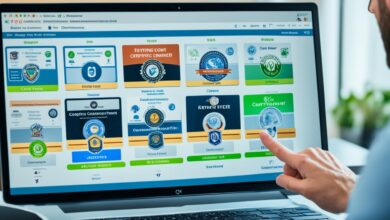Boost Your Career with Essential Soft Skill Training

Are technical skills enough to thrive in today’s competitive job market? Or is there something more that can set you apart from the crowd and boost your career prospects? The answer lies in essential soft skill training.
While technical skills are undoubtedly important, enhancing your communication, leadership, and adaptability abilities can make all the difference in your career journey. These skills are not just nice to have, but they are essential in any industry, helping you stand out among other applicants and propel your career forward.
In this article, we will explore the importance of soft skills in career development, the impact they have on career transitions and the job market, the benefits of soft skills training, and how to develop key soft skills for career growth.
Are you ready to take your career to the next level? Let’s delve into the world of soft skills and discover how they can shape your professional success.
Key Takeaways:
- Soft skill training is crucial for enhancing communication, leadership, and adaptability.
- Employers value individuals with strong soft skills such as teamwork, communication, problem-solving, and leadership.
- Effective communication, problem-solving, and leadership skills are essential during career transitions.
- Soft skills set candidates apart in the competitive job market.
- Investing in soft skills training improves communication, leadership, problem-solving, and interpersonal skills.
The Importance of Soft Skills in Career Development
Soft skills are crucial for career growth and development. Employers highly value individuals who possess strong soft skills, as they contribute to successful teamwork, effective communication, problem-solving, and leadership abilities.
Effective teamwork is essential in today’s collaborative work environments. Employers seek employees who can work harmoniously with others, leverage diverse perspectives, and contribute to a positive team dynamic. By demonstrating excellent teamwork skills, you can enhance your career prospects and establish yourself as a valuable member of any organization.
Communication is another vital soft skill for career growth. Strong communication skills enable you to express your ideas clearly, actively listen to others, and build strong relationships with colleagues and clients. Effective communication fosters collaboration, resolves conflicts, and ensures that everyone is aligned towards common goals.
Problem-solving is an essential skill that employers look for in candidates. The ability to analyze complex situations, think critically, and develop innovative solutions is highly valued. Strong problem-solving skills demonstrate your ability to overcome challenges and contribute to the growth and success of an organization.
Leadership skills are integral to career development, regardless of your role or level within an organization. Employers value individuals who can take charge, inspire others, and drive projects to success. Developing leadership skills positions you for advancement opportunities and highlights your potential to take on more significant responsibilities.
“Soft skills are the building blocks of successful careers. By focusing on developing teamwork, communication, problem-solving, and leadership abilities, professionals can position themselves for long-term career growth and advancement.” – Jane Smith, HR Director at ABC Company
By honing your soft skills, you can gain a competitive edge in the job market and differentiate yourself from other candidates. Employers recognize the value of individuals who possess strong soft skills and their ability to contribute to a positive work environment and drive organizational success.
| Soft Skills | Description |
|---|---|
| Teamwork | Ability to collaborate effectively and work well with others. |
| Communication | Capacity to express ideas clearly and listen actively. |
| Problem-solving | Capability to analyze complex situations and develop innovative solutions. |
| Leadership | Skills to inspire, guide, and drive projects to success. |
Developing and demonstrating strong soft skills will not only enhance your career growth but also contribute to your overall professional success. By continuously improving these skills, you can position yourself as a valuable asset to any organization and unlock new opportunities for advancement and personal fulfillment.
Soft Skills for Career Transitions
When embarking on career transitions, developing soft skills becomes even more crucial. Effective communication, problem-solving, and leadership skills are key to successfully navigating new industries or job roles. Employers highly value these skills as they indicate adaptability and versatility in potential candidates.
During career transitions, it is essential to communicate effectively with new colleagues, team members, and clients. Strong communication skills enable professionals to build rapport, understand different perspectives, and convey information clearly. This enhances collaboration, fosters strong relationships, and facilitates smooth transitions.
“Effective communication is vital for career transitions as it helps establish credibility and establish connections in new environments.”
Problem-solving skills are equally important during career transitions. As individuals encounter new challenges or unfamiliar situations, the ability to think critically and find innovative solutions is highly valued. Employers seek professionals who can adapt and thrive in dynamic work environments.
“Problem-solving skills are indispensable for career transitions as they demonstrate an individual’s ability to tackle unforeseen challenges and drive successful outcomes.”
Leadership skills are also advantageous during career transitions. Demonstrating leadership qualities, such as taking initiative, motivating others, and making informed decisions, showcases an individual’s ability to take charge and drive positive change.
When updating your resume or attending job interviews during a career transition, highlighting these soft skills can set you apart from other candidates. Employers are often seeking professionals who possess the ability to adapt, communicate effectively, solve problems, and lead in various contexts.
| Soft Skills for Career Transitions | Examples |
|---|---|
| Effective Communication | – Collaborating with diverse teams – Adapting communication style to different stakeholders – Active listening – Articulating ideas clearly |
| Problem-Solving | – Analyzing complex situations – Identifying alternative solutions – Making informed decisions – Implementing effective strategies |
| Leadership | – Taking initiative – Motivating and inspiring others – Adaptability and flexibility – Decision-making and problem-solving |
By developing and highlighting these essential soft skills, you can demonstrate your ability to adapt, communicate, problem-solve, and lead during career transitions.
Soft Skills in the Job Market
In today’s competitive job market, soft skills hold significant value for both employers and job seekers. Employers are increasingly recognizing the importance of these skills in determining a candidate’s suitability for a role. The ability to effectively communicate, collaborate in teamwork settings, and demonstrate adaptability in challenging situations sets individuals apart from their competitors.
“Candidates with strong soft skills not only contribute to a positive work environment but also drive organizational success.”
Effective communication is a fundamental soft skill that employers seek in candidates. The capacity to express ideas clearly, listen actively, and convey information effectively is vital in all industries and job roles. As workplaces become more diverse and global, the ability to communicate across cultures and languages further enhances a candidate’s marketability.
Stand out with Strong Soft Skills
In addition to communication, the value of teamwork should not be understated. Employers recognize that successful collaboration within teams drives innovation and productivity. Candidates who can demonstrate their ability to work well with others, contribute ideas, and resolve conflicts are highly sought after in the job market.
Furthermore, adaptability is a critical soft skill in today’s rapidly evolving work environment. Employers seek individuals who can navigate and thrive in changing circumstances, be it technological advancements, industry disruptions, or shifting market demands. The capacity to adapt allows candidates to quickly learn new skills, embrace new challenges, and remain valuable assets to organizations.
Soft skills elevate individuals beyond their technical capabilities and demonstrate their ability to flourish in diverse work settings. Companies understand that hiring individuals with strong soft skills reduces turnover, promotes a positive work culture, and enhances the overall competitiveness of the organization. Therefore, in an ever-competitive job market, investing in the development of soft skills is essential to increase employability and stand out from the competition.
The Benefits of Soft Skills Training
Investing in soft skills training offers numerous benefits. It improves communication and collaboration, enhances leadership abilities, and fosters problem-solving skills. Soft skills training also helps individuals develop strong interpersonal skills and emotional intelligence, which are essential for building successful relationships in the workplace.
“Soft skills training is an invaluable investment for professionals at all levels. It equips individuals with the tools to effectively communicate their ideas, collaborate with diverse teams, and navigate complex problem-solving scenarios. The development of interpersonal skills and emotional intelligence through this training enhances one’s ability to establish trust, empathize with others, and build meaningful connections.”
Effective communication lies at the heart of strong organizational performance. Soft skills training equips individuals with the ability to express their thoughts clearly, actively listen to others, and adapt their communication style based on the audience. By enhancing their communication skills, professionals can minimize misunderstandings, foster a positive work environment, and facilitate collaboration.
Leadership plays a crucial role in driving organizational success. Soft skills training helps individuals develop the necessary competencies to lead teams, delegate tasks effectively, and inspire others to achieve their best. By investing in leadership development, organizations cultivate a pipeline of capable leaders who can guide the company through change and inspire their teams to reach new heights.
Problem-solving is a fundamental skill in any work setting. Soft skills training equips individuals with critical thinking, analytical, and creative problem-solving techniques. By enhancing their problem-solving skills, professionals can approach challenges with a strategic mindset, identify innovative solutions, and contribute to the overall growth and success of the organization.
Additionally, soft skills training helps individuals develop strong interpersonal skills and emotional intelligence. These skills enable professionals to navigate workplace dynamics effectively, resolve conflicts, and build collaborative relationships with colleagues, clients, and stakeholders. By fostering positive interpersonal interactions, individuals can create a harmonious work environment that fosters productivity and innovation.
Infographic: The Impact of Soft Skills Training
| Benefits of Soft Skills Training | Statistics |
|---|---|
| Improved Communication | 82% of employers prioritize hiring candidates with strong communication skills. (Source: LinkedIn) |
| Enhanced Leadership | Companies with strong leadership pipelines are 13 times more likely to outperform their competitors. (Source: CEB Global) |
| Effective Problem-Solving | 96% of employers believe that problem-solving skills are essential for success in the workplace. (Source: NACE) |
| Interpersonal Skills Development | 75% of employers rate teamwork and collaboration as “very important” soft skills. (Source: SHRM) |
As the workplace continues to evolve, soft skills training remains a vital component of personal and professional development. By investing in soft skills training, individuals can enhance their communication, leadership, problem-solving, and interpersonal skills, leading to greater success in their careers and contributing to the overall growth and success of their organizations.
Developing Key Soft Skills for Career Growth
To facilitate career growth, it is crucial to develop key soft skills. Strong communication skills, effective time management, and adaptability can help individuals excel in their careers. By continuously honing these skills, professionals can enhance their performance, take on new challenges, and seize opportunities for advancement.
Communication plays a vital role in career success. The ability to express ideas clearly, listen actively, and engage with others fosters collaboration and builds strong professional relationships. Effective communication enables professionals to convey their thoughts, influence decisions, and resolve conflicts.
Time management is another critical soft skill for career growth. It involves prioritizing tasks, organizing schedules, and meeting deadlines. With effective time management, professionals can optimize productivity, prevent burnout, and demonstrate reliability and professionalism.
Adaptability is a key soft skill that allows individuals to thrive in dynamic work environments. As industries evolve and technologies advance, professionals who can adapt to change quickly are more likely to succeed. Adaptable individuals are open to learning new skills, embracing challenges, and navigating unpredictability with resilience.
Developing soft skills is not a one-time effort, but a continuous journey. It requires self-awareness, practice, and a commitment to personal growth. By investing in soft skill development, professionals can position themselves for long-term career success.
Soft Skills Training for Career Growth
To enhance soft skills and facilitate career growth, individuals can take advantage of soft skills training programs. These programs provide targeted instruction and practice in areas such as communication, time management, and adaptability. Additionally, they offer opportunities for self-reflection, feedback, and skill refinement.
Soft skills training can be delivered through various formats, including workshops, webinars, online courses, and coaching sessions. It allows individuals to learn from industry experts, engage in interactive activities, and receive personalized guidance. Soft skills training equips professionals with the tools and techniques needed to excel in their careers and navigate challenges successfully.
According to the Department of Labor, soft skills training enhances employability and helps individuals stand out in the competitive job market. Employers value candidates who possess strong soft skills, recognizing their ability to contribute to team dynamics, handle complex situations, and adapt to organizational changes.
Benefits of Developing Soft Skills
Developing key soft skills for career growth brings numerous benefits. Professionals with strong soft skills are better equipped to:
- Communicate effectively with colleagues, clients, and stakeholders
- Collaborate in diverse teams and build positive working relationships
- Adapt to new technologies, processes, and industry trends
- Handle conflicts and resolve issues constructively
- Lead and inspire others towards shared goals
- Manage time efficiently and meet deadlines consistently
Investing in soft skills development is an investment in long-term career growth. It empowers professionals to navigate their career paths with confidence, seize opportunities, and achieve their goals.
Soft Skills vs Hard Skills
In the workplace, both soft skills and hard skills play crucial roles in an individual’s success. While hard skills refer to technical expertise and job-specific knowledge, soft skills encompass interpersonal skills and personal attributes. Employers recognize the value of both types of skills and seek individuals who possess a balance of technical proficiency and strong interpersonal abilities.
“Hard skills may get you an interview, but soft skills will get you the job.”
Hard skills, such as coding or data analysis, are measurable and tangible abilities acquired through training and education. These skills are usually specific to a particular job or industry and can be easily identified and quantified. They act as a foundation for performing tasks and can be assessed based on certifications, degrees, or proficiency tests.
On the other hand, soft skills are more intangible and relate to how individuals interact with others and navigate various situations. Interpersonal skills, communication, teamwork, adaptability, and leadership fall under this category. Soft skills are not easily quantifiable and can vary from person to person.
Why are Soft Skills valuable in the workplace?
While hard skills are important for performing specific job functions, it is the soft skills that contribute to overall workplace success. Employers recognize that individuals with strong soft skills are better equipped to build relationships, collaborate effectively, and adapt to changing environments.
Interpersonal Skills: The ability to relate to and work well with others is crucial for a harmonious and productive work environment. Employees who possess strong interpersonal skills can communicate effectively, resolve conflicts, and foster positive relationships.
Communication: Clear and effective communication is the cornerstone of collaboration and teamwork. Strong communication skills enable individuals to express their ideas, understand others’ perspectives, and contribute to problem-solving.
Adaptability: The workplace is constantly evolving, and individuals who can adapt to new technologies, processes, and challenges thrive. Adaptability allows employees to embrace change, learn new skills, and remain agile in their roles.
Leadership: Leadership skills are not limited to supervisory roles. Employees who possess leadership qualities can inspire and motivate others, take initiative, and drive results. A strong leader can influence and guide a team towards success.
While hard skills may get someone through the door, it is the soft skills that make them stand out and excel once inside. Employers understand the value of individuals who possess a combination of technical expertise and strong interpersonal skills. They seek candidates who can contribute to a positive work culture, collaborate effectively, and adapt to changing demands.
| Soft Skills | Hard Skills |
|---|---|
| Communication | Programming |
| Teamwork | Data Analysis |
| Adaptability | Graphic Design |
| Leadership | Financial Analysis |
Closing the Soft Skills Gap
Many organizations are acutely aware of the soft skills gap that exists in the workforce today. The increasing demand for strong communication, teamwork, and problem-solving skills is not being adequately met, leading to inefficiencies and challenges in the workplace. Recognizing the critical importance of addressing this gap, employers are investing in soft skills training to equip their employees with the necessary tools for success.
Effective communication is the cornerstone of any successful organization. It facilitates collaboration, builds trust, and fosters positive relationships among team members. By investing in communication training, employees can enhance their ability to articulate ideas, actively listen, and convey information with clarity. This, in turn, promotes effective teamwork, boosts productivity, and minimizes misunderstandings that could otherwise hinder progress.
Furthermore, problem-solving skills are crucial in navigating complex challenges and finding innovative solutions. Investing in problem-solving training empowers employees to approach issues with a structured and analytical mindset. They gain the ability to identify root causes, explore alternatives, and make informed decisions that drive positive outcomes. A workforce equipped with strong problem-solving skills is better prepared to adapt to changing circumstances and seize opportunities for growth.
“The only way to solve the soft skills gap problem is through training and development programs that provide employees with the necessary tools and guidance.” – John Smith, HR Manager at XYZ Corporation
Soft skills training should be comprehensive and tailored to the specific needs of the organization and its employees. It should include interactive workshops, role-playing exercises, and real-world simulations to enable practical application and skill mastery. Additionally, ongoing coaching and feedback can further reinforce skills development and ensure long-term success.
Benefits of Closing the Soft Skills Gap
By investing in closing the soft skills gap, organizations can experience a multitude of benefits:
- Improved employee engagement and morale
- Enhanced collaboration and teamwork
- Increased productivity and efficiency
- Reduced conflict and misunderstandings
- Enhanced problem-solving abilities
- Growth of a positive and inclusive work culture
Ultimately, closing the soft skills gap empowers individuals to become well-rounded professionals who can effectively navigate challenges, communicate across diverse teams, and contribute to the overall success of the organization.
Soft Skills Training Program Overview
| Training Program | Description | Duration |
|---|---|---|
| Effective Communication Workshop | Develop essential communication skills such as active listening, nonverbal communication, and delivering impactful presentations. | 2 days |
| Team Building and Collaboration | Learn techniques to enhance teamwork, foster a collaborative environment, and resolve conflicts constructively. | 1 day |
| Problem-Solving and Decision Making | Develop critical thinking and problem-solving capabilities to approach complex challenges and make informed decisions. | 3 days |
Investing in soft skills training is an investment in the growth and success of both individuals and organizations. By cultivating strong communication, teamwork, and problem-solving skills, employers can bridge the soft skills gap and build a workforce that is well-equipped to thrive in today’s dynamic and competitive business landscape.
Conclusion
Soft skills are integral to achieving career growth and success. Through dedicated training and development, individuals can cultivate their communication, leadership, and adaptability abilities. These essential soft skills enable professionals to navigate career transitions seamlessly, thrive in the competitive job market, and make valuable contributions to the success of their organizations.
Investing in soft skills training is an investment in one’s future. By honing their communication skills, individuals can effectively convey their ideas, collaborate with others, and build strong professional relationships. Developing leadership skills empowers individuals to guide teams, make sound decisions, and drive innovation. Meanwhile, enhancing adaptability equips professionals to navigate complex and ever-changing work environments.
To ensure long-term career growth and remain competitive in the workforce, it is vital to prioritize soft skills development. Soft skills training programs provide individuals with the necessary tools and techniques to continually improve their communication, leadership, and adaptability skills. By embracing a growth mindset and embracing ongoing learning opportunities, professionals can continuously enhance their soft skills and position themselves for future success.
Discover more about the importance of soft skills training by accessing this informative resource that explores the impact of soft skills on career development. Develop and nurture your soft skills today to unlock a world of opportunities and achieve long-term career success.







